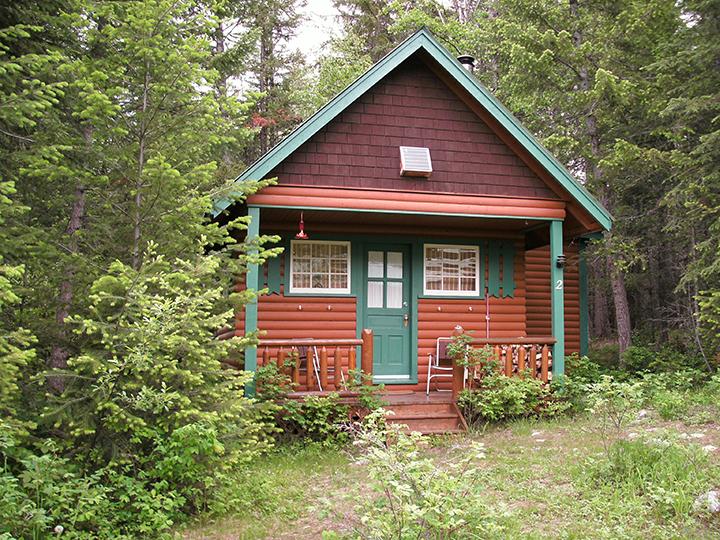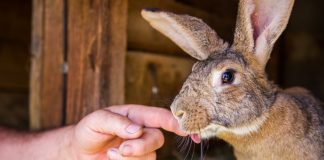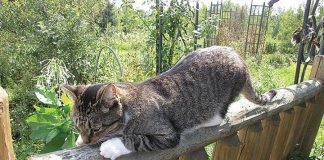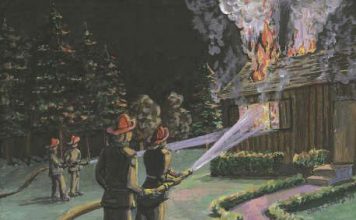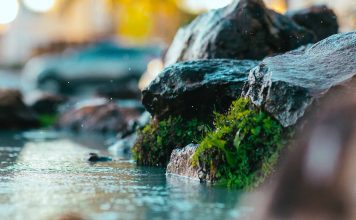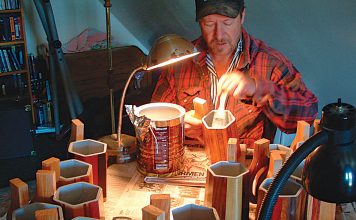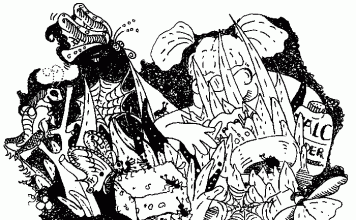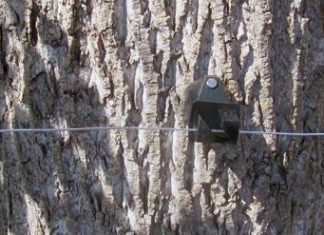 |
|
| Issue #65 • September/October, 2000 |
Right now I’m sitting in a south-facing huge, sunny window, looking through our own private valley to a larger mountain valley below and the pine covered mountains beyond. There isn’t another house in sight. Only snowy slopes, gorgeous rock outcroppings on the sides of the little valley, pines, and an eagle soaring overhead.
Our new home is a modest 1,000 square feet, but it’s well-built, has pretty red fir floors, a huge kitchen, and views to die for out each huge window, even out through the large front porch across the whole front of the house.
Now, a lot of you know that we had originally planned to build our homestead in Alaska. We’d found 320 acres of remote paradise north of the Alaska Highway between two rivers that we could afford. It had no cabin, and 40 acres of tough scrub second-growth brush had to be cleared in two years’ time in order to get a title. It was a great little place, in a mountain valley with tremendous views of the Alaska Range right out the door.
We thought we had our ranch in New Mexico sold. We had a contract and down payment, and we made preparations to go. Blood testing had been done on the animals. My oldest son, Bill, had bought plane tickets to fly down and help us drive, and we had money down on a tractor and equipment a friend wanted to sell. The works. Then our buyer dropped out.

David Clay has his own criteria for a homestead. |
And we lost our Alaska homestead because the owner was in a hurry to sell because of the clearing clause on his land.
So we again advertised our place, taking up valuable time. As we knew we wanted remoteness, we watched the spring turn to summer. And we searched for another place.
We’d seen some interesting places advertised in British Columbia, and we found more of what we could afford and the wilderness we needed. So we really investigated several different areas and stumbled on another great place.
This one was 160 acres of wilderness, right on a salmon/trout river, with a glacier run-off stream right past the little cabin. There was wildlife galore. We saw huge bull moose, wolf tracks on our beach, and deer tracks everywhere. Folks around said we’d also have grizz visitors, as well as black bears.
Dealing with bureaucracy
As we again had our ranch sold, we travelled up to Canada, checked out our place and talked to Canadian Immigration at the border regarding our immigration as Resident Aliens. We were told that although the normal procedure is to require immigrants to have their Immigrant Visa in hand when they move up, they would allow us to enter, provided we had our “papers in the system” and had our letter of receipt from the Canadian Consulate General’s office in Buffalo.
We did. Let me tell you a little about Canadian Immigration, so someone does not have to go through what we did. Neither Bob nor I have had so much as a parking ticket in our lives. He worked for the Department of State in Embassy Service, as well as having served in Vietnam for three years, the Army after that, and a lifetime of security work. We both have an income, and were to pay cash for our homestead.
We thought we would be good immigration candidates. Both of us had Canadian grandparents, uncles and aunts, although we have no living relatives there now that we know of.
To immigrate to Canada, you must fill out lengthy forms for your visa, indicating income (Canada wants no welfare immigrants), health (Canada wants no immigrants with health problems that may cost the government), and employment (Canada does not want immigrants who will either not find work easily or will infringe on Canadian workers’ employment). Included with this form are: a current passport (not required of visitors, but required for immigrants), Criminal Clearance by the FBI (our local sheriff took our fingerprints and we submitted them to the FBI with the appropriate fee), and supporting documents such as birth certificates, etc. The fee for our family entering under a business classification (as I am a writer) was $1,200.
After your papers are in the “works” you will be required to submit to a physical examination, which is given only in certain larger U.S. cities, requiring travel and another fee for the exam, which also includes chest X-rays.
The time the entire process takes, before your Immigrant Visa is in your hands, can take up to a year or more. This is where we screwed up. Believing the folks at the border crossing Immigration Office, we hit the border with a 26-foot U-Haul truck, a 16-foot stock trailer with four horses and a cow (all multiple-blood testedI think we have the “healthiest” animals in the U.S.) on the 29th of December.
To make a long, sad story short, we were told that we had received “erroneous information from someone” and that under no circumstances could we enter Canada until we had our Immigrant Visa and Right of Landing Permit (another $1,200 fee) in hand.

This is a view of our house, including the fornt porch, |
There we were, with not much cash on hand, being politely escorted out of Canada by the head Immigration officer, our ranch in New Mexico sold, the money sent on to British Columbia, and a trailer load of livestock getting awfully tired of being stuffed in a jostling trailer.
As a last hope, Bob, remembering how long our contract had taken to get to us from B.C. with Fed-Ex, took a long gamble and called our realtor in B.C. to see if the cashier’s check we’d sent via Express Mail, six days earlier, had cleared. While he was on the phone in the U.S. Customs Office, our vehicles were sniffed by narc and explosives dogs and gone through by Customs Officers. I sat with my son, Bill, explaining why we were kicked out of Canada.
Our first break
Two days to the new year, nowhere to go, it was the worst day of all of our lives. If, indeed, our down payment check had been received and cashed, we’d be locked into our B.C. homestead, and we had no way to get to it for nearly a year. And we had little money to do anything in the States.
Then, in what we think was an act of God, Bob came back from the phone with the news that the check had not yet been received by the title company in B.C., after six days, despite Express Mail’s claims for three-day delivery. We at least had a chance. Bob was able to gain assurance that the title company would send the check back to us in Montana at my son, Javid’s, address (Without an address of our own, we had become non-people.).
To make another long story short, I called a realtor friend, Pat Byrne, in Missoula, Montana, who works with Mar-West Properties. Pat had shown us a neat mining claim a year ago and we knew he knew what we were looking for.
Not only did Pat spend hours on the Internet contacting realtors and property owners for us, but he insisted that we unload our trail-weary livestock at his farm out of town.
Pat searched far and wide and so did we. I looked through so many real estate magazines that I was about brain-dead. We knew Montana from when we had lived there six years ago, so we knew areas we liked and ones we wanted to steer clear of. It made the process quicker, but it was still frustrating.
We kept on looking at places, getting stuck in several four-foot deep snow drifts on remote mountainsides. Found one place, but couldn’t feasibly get our livestock and hay in. Found another, but it was in a rather built-up subdivision, the log house needed major repair, and it was $30,000 more than we could afford.
We find our home
Then, as my son Bill and I stood at a pay phone in the tiny town of Avon with a new snowfall pelting us, we struck pay dirt. A new listing (three-days old) had just come in; a house on a remote 20 acres up in the mountains. We immediately took off to the listing realtor’s office to get a look at photos and pick up a map.
The photos looked okay, nothing spectacular, but we were getting desperate. Nothing was turning up and Bill had to fly out soon to get back to his job. The realtor could not show the place until the following day and it was late in the day, but we wanted a look. So, following a sketchy map with the realtor’s words, “You’ll never find it,” ringing in our ears, we tore for Wolf Creek, then Craig, and the mountain road beyond.
I read the map and Bill drove up the winding trail. Then we came on a trail that was not on the map and took it “up.” Stopping on a rocky ledge, we got out to look over the country, and there, just below, we spotted the placeour place. Sometimes you just know.
The next day we looked through the house with wonder. How could we be so fortunate to find such a pretty, well-built house on remote (but relatively accessible) land that, most importantly, we could afford? Then we received the answer: there had been a divorce and, in the process, the spring that supplies the house had frozen.
Gratefully, we quickly signed a contract, knowing that no longer were we among the homeless.
The search
We’ve had a busy and stressful year, but it is no coincidence that we found three homesteads that met our limited requirements. We worked hard and long to dig them up. Perhaps some of the things we did will help you with your search for a homestead:
- In each area of our search we contacted tourist information centers, Chambers of Commerce, Fish and Game Departments, Forest Service offices, and realtors.
- We studied maps, especially Forest Service maps, which detail every remote road and trail and show private land in or near government land.
- We were exact when talking to realtors regarding our needs in a property. For example, we wanted livestock so the property had to have pasture. We needed a garden area, and we didn’t want our neighbors too close. And, perhaps most importantly, we knew how much we could afford.
- We read through local real estate sales magazines, plus the Rural Property Bulletin, a nationwide listing of mostly private-sale rural properties. We read the real estate listings in local “shoppers” (Mini-Nickel-type), talked to locals at the feed stores, in cafes, on the sidewalk. We even put our own ad in the local shopper for a few weeks (That’s how we found a great deal on our previous Montana homestead.).
Things to check out
Then, when you’ve got something to look at, go take a gander with a critical eye. How about water? (We’ve got a frozen spring and must haul water from the fire department in a town 20 miles away in a 250-gallon poly tank, but it’s no big deal until spring.) Don’t depend on a well unless there are other fairly shallow wells nearby, as especially in the mountains water can be uncertain. You may have to go down 1,000 feet, and at $15-$20 a foot for just the hole, this can get pricey pretty quick.


